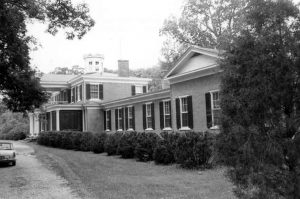
The Board of Historic Resources co-holds an easement on Moss Neck Manor in Caroline County.
*Note: The Virginia Department of Historic Resources does not give tax advice and recommends that donors consult their attorney, accountant, and/or tax advisors regarding the tax implications of a gift of easement. A gift of a qualified conservation easement in perpetuity may qualify as a non-cash charitable gift which may yield a deduction for federal income tax purposes and a credit for state income tax purposes. An independent qualified appraiser must establish the value of the easement that is primarily based on the value of the development rights relinquished by the donor. Once that value is established, it becomes the basis for calculating tax benefits.
Summary of Tax Benefits
1. Federal Charitable Gift Deduction:
26 U.S.C. Section 170(h) establishes the criteria for a “qualified gift of a conservation easement.” According to the federal tax code, certain contributions for “certified historic structures” or “historically important land areas” may qualify as a gift of conservation easement. For tax year 2015 and after, a donor of a conservation easement may deduct up to 50% of adjusted gross income, which may be carried forward for an additional fifteen years or until the donation is fully expended, whichever comes first. IRS Form 8283 must be filed to obtain this deduction.
Special rules and limitations on deductions for historic resources:
A. Special Rules with Respect to Buildings and Structures in Registered Historic Districts: See 26 U.S.C. Sections 170(h)(4)(B) and (C) for additional restrictions related to contribution of a qualified conservation easement for the purpose of preserving a “certified historic structure” or “historically important land area,” and definition of the term “certified historic structure” within the context of this section of the U.S. code. http://uscode.house.gov/view.xhtml?req=granuleid:USC-prelim-title26-section170&num=0&edition=prelim
B. For easement donors that have participated in the Federal Rehabilitation Tax Credit Program: See 26 U.S.C. Section 170(f)(14) for a provision that reduces the deduction for qualified conservation contributions involving properties for which the taxpayer has benefited from the Rehabilitation Tax credit within the previous five years.
2. Virginia Land Preservation Tax Credits:
The “Virginia Land Conservation Incentives Act of 1999” (see Section 58.1-510 through 58.1513 of the Code of Virginia, as amended), provides Virginia taxpayers who donate a conservation easement with a Virginia state income tax credit equal to 40% of the value of the easement. The tax credit will offset or reduce calculated tax liability and results in a dollar-for-dollar reduction in tax liability. The amount of the credit that may be used by a taxpayer may not exceed $20,000 for each of the taxable years from 2015 through the 2019 and $50,000 for taxable year 2020 and thereafter. Any unexpended portion may be carried forward for a maximum of 13 years (for taxable year 2015 and after) or transferred to another Virginia taxpayer.
The Virginia Department of Taxation does impose a transfer fee on the sale of land preservation tax credits. This fee is calculated as either 2% of the value of the donated conservation interest.
Land preservation tax credits in excess of $1 million or more will be issued only if the conservation value of the donation has been verified by the Director of the Department of Conservation and Recreation (“DCR”) based on criteria adopted by the Virginia Land Conservation Foundation. Pre-filing review of the conservation value is available through DCR. Additional information is available at the following web link: http://www.dcr.virginia.gov/virginia-land-conservation-foundation/document/vlcfprocedfinal.pdf
There is a $75 million limit on the amount of tax credits that the Department of Taxation may issue in each calendar year. The credits are issued on a “first-come, first-served basis” until the cap is reached. See the Virginia Department of Taxation website for additional information: https://www.dcr.virginia.gov/land-conservation/lp-taxcredit
Special rules and limitations on tax credits for historic resources:
A. No more than 25% of the total credit shall be for reductions in value for any structures or other improvements to the land.
B. Additionally, any building that serves as the basis, in whole or in part, of a tax credit under the Virginia Land Conservation Incentives Act, cannot also serve as the basis for a historic rehabilitation tax credit for a period of five years following the donation on which the credit is based (see Code of Virginia, Section 58.1-513 and 58.1-339.2).
3. Estate Tax Deduction:
Placing a conservation easement on your property may result in a reduction of estate taxes.
4. Local Property Taxes:
Tax assessors are required by law to take an easement into account in valuing your property (see Code of Virginia 10.1-1011 and 58.1-3205).
See the links below for DCR Review Criteria, tax forms, and instructions::
- Land Preservation Tax Credit – Conservation Value Review Criteria by VLCF Board (PDF)
- DCR Procedural Guidelines (PDF)
- Tax forms (from the Va. Dept. of Taxation):
- VA Department of Taxation Laws, Rules, and Decisions Page
- Virginia’s Land Preservation Tax Credit Brochure (PDF)
- Q&A Document

